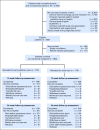Effects of Early Integrated Palliative Care in Patients With Lung and GI Cancer: A Randomized Clinical Trial
- PMID: 28029308
- PMCID: PMC5455686
- DOI: 10.1200/JCO.2016.70.5046
Effects of Early Integrated Palliative Care in Patients With Lung and GI Cancer: A Randomized Clinical Trial
Abstract
Purpose We evaluated the impact of early integrated palliative care (PC) in patients with newly diagnosed lung and GI cancer. Patients and Methods We randomly assigned patients with newly diagnosed incurable lung or noncolorectal GI cancer to receive either early integrated PC and oncology care (n = 175) or usual care (n = 175) between May 2011 and July 2015. Patients who were assigned to the intervention met with a PC clinician at least once per month until death, whereas those who received usual care consulted a PC clinician upon request. The primary end point was change in quality of life (QOL) from baseline to week 12, per scoring by the Functional Assessment of Cancer Therapy-General scale. Secondary end points included change in QOL from baseline to week 24, change in depression per the Patient Health Questionnaire-9, and differences in end-of-life communication. Results Intervention patients ( v usual care) reported greater improvement in QOL from baseline to week 24 (1.59 v -3.40; P = .010) but not week 12 (0.39 v -1.13; P = .339). Intervention patients also reported lower depression at week 24, controlling for baseline scores (adjusted mean difference, -1.17; 95% CI, -2.33 to -0.01; P = .048). Intervention effects varied by cancer type, such that intervention patients with lung cancer reported improvements in QOL and depression at 12 and 24 weeks, whereas usual care patients with lung cancer reported deterioration. Patients with GI cancers in both study groups reported improvements in QOL and mood by week 12. Intervention patients versus usual care patients were more likely to discuss their wishes with their oncologist if they were dying (30.2% v 14.5%; P = .004). Conclusion For patients with newly diagnosed incurable cancers, early integrated PC improved QOL and other salient outcomes, with differential effects by cancer type. Early integrated PC may be most effective if targeted to the specific needs of each patient population.
Figures



Comment in
-
Tailoring Palliative Care to the Changing Needs of People Facing Cancer.J Clin Oncol. 2017 Mar 10;35(8):813-815. doi: 10.1200/JCO.2016.71.2174. Epub 2017 Jan 23. J Clin Oncol. 2017. PMID: 28113031 No abstract available.
-
[Early integrated palliative care in cancer patients improves quality of life and encourages discussions about preferences for care at the end of life].Strahlenther Onkol. 2018 Feb;194(2):178-180. doi: 10.1007/s00066-017-1244-4. Strahlenther Onkol. 2018. PMID: 29264622 German. No abstract available.
References
-
- Zimmermann C, Riechelmann R, Krzyzanowska M, et al. Effectiveness of specialized palliative care: A systematic review. JAMA. 2008;299:1698–1709. - PubMed
-
- Smith TJ, Temin S, Alesi ER, et al. American Society of Clinical Oncology provisional clinical opinion: The integration of palliative care into standard oncology care. J Clin Oncol. 2012;30:880–887. - PubMed
-
- Zimmermann C, Swami N, Krzyzanowska M, et al. Early palliative care for patients with advanced cancer: A cluster-randomised controlled trial. Lancet. 2014;383:1721–1730. - PubMed
Publication types
MeSH terms
Grants and funding
LinkOut - more resources
Full Text Sources
Other Literature Sources
Medical
Miscellaneous

